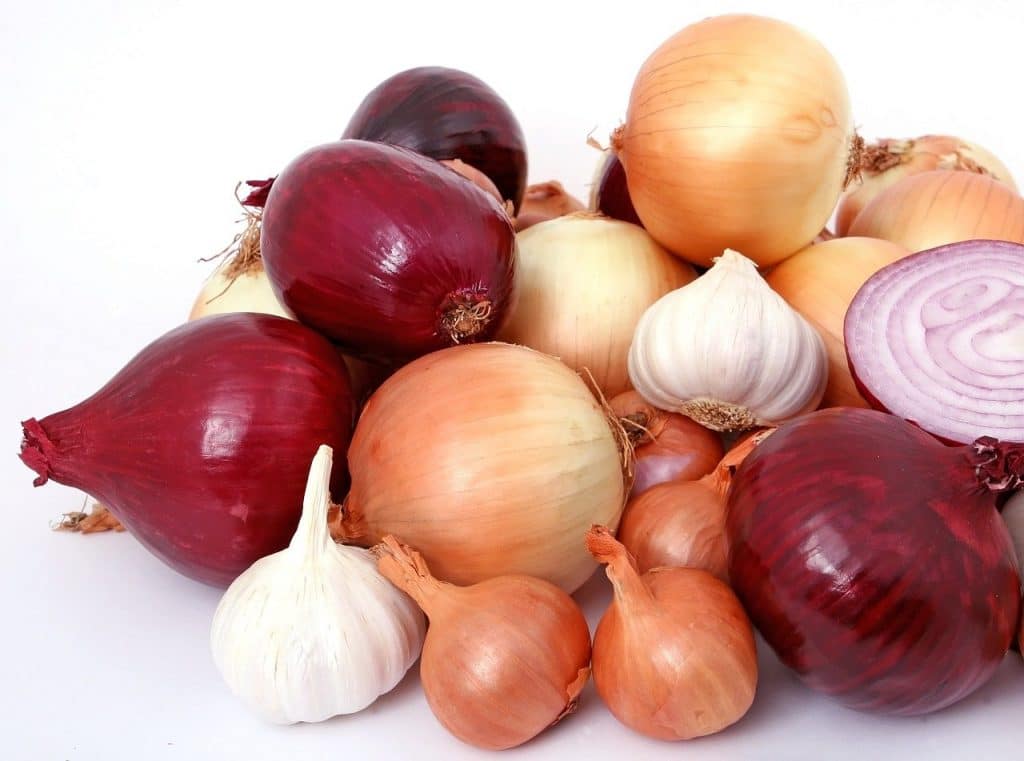
Onions and gout: Onions are low in calories but high in vitamins and minerals. They’re also packed full of antioxidants, one of the most potent of which is the flavonoid Quercetin. But are they safe in a gout diet? Here you’ll discover why onions are not only safe to eat but may actually help to reduce your risk of gout.
Onions and Gout
What is gout?
Gout is a form of inflammatory arthritis caused by abnormally high levels of uric acid in the blood — a condition called hyperuricemia — out of which microscopic needle-like crystals form in the joints and associated tissue.
Uric acid is a byproduct of purine metabolism, which purines exist in our body’s cells and in the cells of the food we eat.
Around 30% of the purines in our bodies comes from the food we eat, so people with gout have to be careful with their diet.
So now let’s take a look at onions…
Onions are part of the allium family which also includes things like garlic, leeks, shallots, scallions and chives.
- The top three producers in the world today are China, India and the USA.
Health Benefits of Onions
Onions are low in calories but high in vitamins and minerals. They’re particularly high in vitamin C, vitamins B6 (pyridoxine) & B9 (folate), and potassium. These have numerous health benefits. For example…
Vitamin C is a powerful antioxidant, important for:
- immune system function
- maintaining healthy blood sugar levels
- common colds and asthma prevention
- controlling high blood pressure
…and protecting against cancer, heart disease, stroke, and many other conditions and diseases.
Folate aids in the formation of red blood cells as well as in cell growth and cell function. It’s also very important in early pregnancy to help prevent some birth defects.
Pyridoxine helps the central nervous system to function properly. It also helps in the manufacture of hemoglobin and in glucose and protein metabolism.
Potassium plays a key role in the normal functioning of all your body’s cells. It keeps your heartbeat regular, your muscles functioning properly, and regulates fluid balance. And it helps to counteract the negative effects of sodium and so helps control blood pressure.
Onions are also a good source of gut-healthy dietary fiber, especially soluble fibers called fructans which help to feed the beneficial bacteria in your gut.
In addition, they’re packed full of over 25 different varieties of flavonoid antioxidants that help to hoover-up free radicals that cause cellular damage which can lead to cancers and other diseases, such as inflammatory joint disease, asthma, atherosclerosis and dementia.
One of the most potent of these antioxidants is quercetin which has powerful anti-inflammatory properties and has been linked to reduced blood pressure and blood sugar.
Onions are a good source of manganese, copper, and phosphorus, too.
So onions, clearly, are a highly beneficial food. But, since us gout sufferers have to be very conscious of our diet, should we be eating them?
Are Onions Bad for Gout?
Onions are a low-purine food, meaning they produce less than 100 mg of uric acid per 3.5 oz (100 g) serving when ingested.
So onions are generally safe in a gout diet.
But, not only are they safe, they may even be able to help your gout in a more proactive way.
For example, studies have associated:
- vitamin C with a reduction in serum uric acid levels and a decreased risk of gout.
- a high-fiber diet with a decreased risk of hyperuricemia.
- antioxidants with a reduction in inflammation of the joints.
And, remember, vitamin C is also a powerful antioxidant with anti-inflammatory properties.
Onions are also one of the highest sources of quercetin that studies have shown can inhibit the production of uric acid and inflammation.
In addition, onions are an alkaline-forming food that may help to develop a more alkaline urine environment. This environment facilitates the removal of uric acid from the body and a decreased risk of uric acid kidney stones.
So, not only are onions safe for gout sufferers, they have properties that may help to reduce the risk of gout when eaten as part of a well balanced gout diet.
Which Types of Onions are Best?
All varieties are nutritious but red and yellow (also called brown) onions have the highest concentrations of free-radical-bashing antioxidant compounds.
And red and chartreuse onions have the highest amounts of quercetin, which can help us gout sufferers by inhibiting the production of uric acid as well as inflammation.
In all varieties, the highest antioxidant concentrations are to be found in the two or three outer layers, so these shouldn’t be discarded as often happens. For example, red onions can lose around 20% of their quercetin and some 75% of their anthocyanins (another antioxidant) with this practice.
But be careful how you cook them.
Well, not so much how you cook them, but rather, what you cook with them.
For example, liver or kidneys with onions are definitely out since they are high in purines and must be avoided. Beef and pork are medium-purine meats that may be eaten, but only in moderation: a maximum of 1 x 3.5 oz (100 g) serving per day, and not every day.
[Note: You’ll discover detailed tables covering high, medium, and low purine foods and ingredients in my guide: Gout Rescue.]
To get their full nutritional value onions are best eaten raw, with salads, for example.
They can also be baked, sautéed, grilled, boiled, or steamed. But bear in mind that cooking them for longer than 30 minutes may destroy much of their nutrients.
Here’s a simple 20 minute recipe for healthy baked onion rings:



